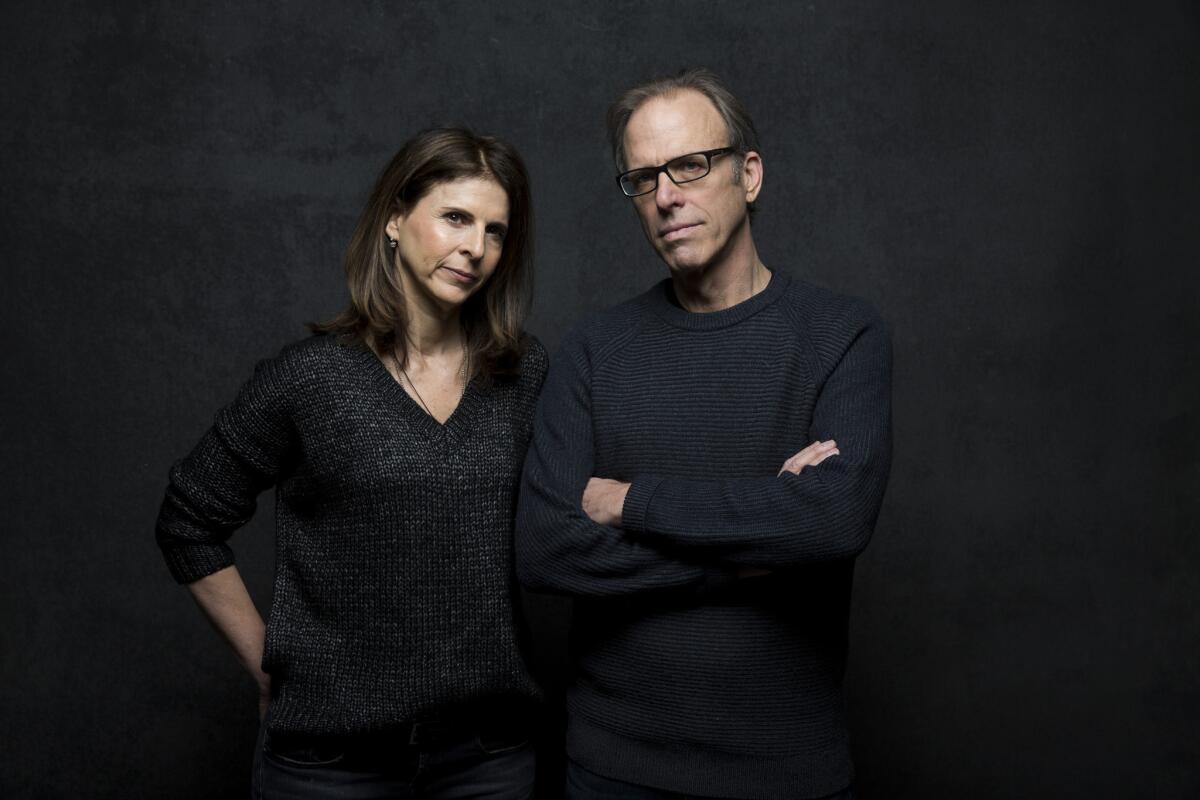Sundance 2015: In ‘The Hunting Ground,’ Jameis Winston’s accuser goes public

- Share via
Reporting from PARK CITY, Utah — When a group of Oregon football players chanted “No means no” after their Rose Bowl victory over Florida State, an unmistakable taunting reference to the rape accusations against Seminoles quarterback Jameis Winston, the moment demonstrated how sexual assault on campus is one of the hottest of contemporary issues. Yet it was just about the last issue that director Kirby Dick and his producing partner Amy Ziering wanted to tackle.
------------
FOR THE RECORD: An earlier version of this article referred to Jameis Winston as a Gators quarterback. Winston was quarterback for the Florida State Seminoles, not the University of Florida Gators.
------------
That’s because this team’s influential last film, “The Invisible War,” took on a similar subject: rape and sexual violence in the military. But it was precisely the success of that 2012 venture in raising consciousness that led them to make “The Hunting Ground,” a devastating indictment of the plague of rapes on campuses that had its premiere at the Sundance Film Festival on Friday afternoon, and to break news about the Winston situation as well.
Though it is only a piece of an intricate mosaic of first-person testimony, commentary and cogent analysis, “The Hunting Ground” (to be aired on CNN and released in theaters by Radius) is the first time Winston’s accuser, Erica Kinsman, has gone public to tell her disturbing story, and to tell it in the context of a wider crisis.
It was visits to colleges for the earlier film that got Dick and Ziering involved in the campus rape issue in the first place.
“We were taking ‘The Invisible War’ around to schools, and we kept getting questions about sexual assault on campus,” says Dick, with Ziering adding: “We were intending to make another film, but we kept getting letters in our in-boxes, ‘Please make this film.’ It really got to us. We were moved.”
Moreover, the filmmakers soon became aware that there were significant differences between the two subjects, a key one being that, Ziering says, “this issue was already starting to get public traction; there was an emerging student movement we could follow and track in real time.”
So “Hunting Ground” spends considerable time with University of North Carolina students Annie Clark and Andrea Pino as they first file a Title IX anti-discrimination complaint against their school for how their rape allegations were handled, and then went on to found the nationwide organization End Rape on Campus.
Another difference, the filmmakers say, was that the fear around this issue was greater than in the military, with college faculty and administrators being especially reluctant to talk on camera as institutions circled the wagons to protect their reputations and their bottom lines.
“I was shocked at the reticence of the faculty and administrators to speak,” says Ziering. “Speaking out could hurt your career. Even if you moved to another institution, you could be branded as a troublemaker.”
One factor that was the same as in “The Invisible War” was the heartbreaking nature of the stories these women tell, and the tendency of colleges and universities to blame the victims when they choose to report alleged incidents.
Ziering, who did many of the interviews, was especially moved by talking to Tom Seeberg, whose daughter, Lizzy, committed suicide in the aftermath of her allegation of a sexual attack against Notre Dame football player Prince Shembo, who was never charged with a crime. “I began to cry, I had to pull myself together,” she remembers, tearing up again at the memory. “Another one who broke my heart was a girl from Berkeley who hadn’t told her parents yet. I was so upset, she gave me her teddy bear.”
Kinsman’s story of her experience with Winston is of a piece with the others, and her detailing of the specifics of the alleged event is chilling. (Winston has claimed the sex was consensual. No criminal charges were filed against him, and the school took no disciplinary action.)
The film notes that the police in Tallahassee, where Florida State is located, did not investigate Kinsman’s report for 10 months, which, the filmmakers say, is an example of the way the power of college sports to earn money and build fanatical loyalty works against women who report being raped by athletes.
Another powerful institutional force with a vested financial interest in minimizing rape claims is what the filmmakers call “the American fraternity industry.”
“Fraternities are in many ways wonderful organizations, but what did surprise us is that on a given campus students can tell you which fraternities are the dangerous ones,” says Ziering. “If the students know, you have to assume people in the administration know, so why isn’t something done?”
One of the key points “The Hunting Ground” makes is that, as Ziering says, “in the vast majority of cases this is not a ‘he said, she said,’ situation; this is a calculated ploy.”
The filmmakers put successful effort into finding a predator willing to go on camera and talk about his methods. “Someone copping to it, that for us was pretty important,” Dick says.
“Though the reality is that 19 of 20 charges is true, only one is a false report, the tendency with this crime is only to disbelieve, and that is very hard for survivors,” Dick says. “They trust and believe the institution will do the right thing. In most cases it doesn’t, and that is really traumatizing. People’s lives are destroyed.
“It’s not just the assault. It’s what follows — when the school turns on them. We hope our film puts pressure on these institutions to think more about their mission than the bottom line.”
Twitter: @KennethTuran
More to Read
Only good movies
Get the Indie Focus newsletter, Mark Olsen's weekly guide to the world of cinema.
You may occasionally receive promotional content from the Los Angeles Times.











